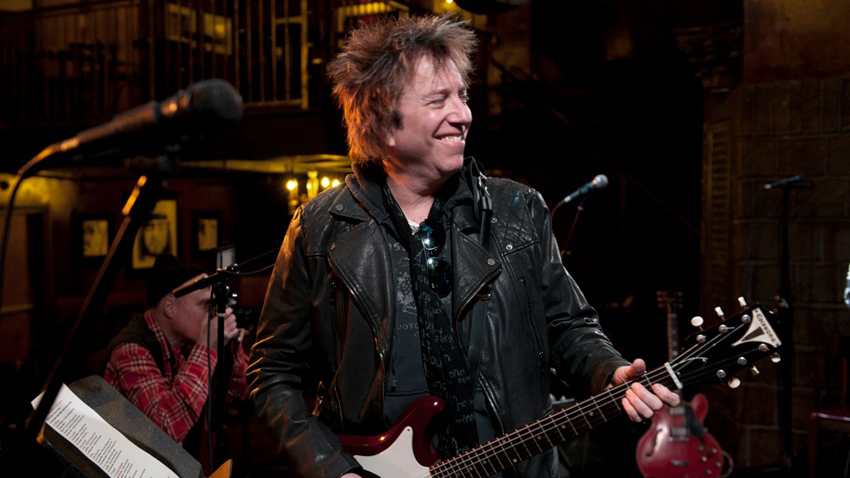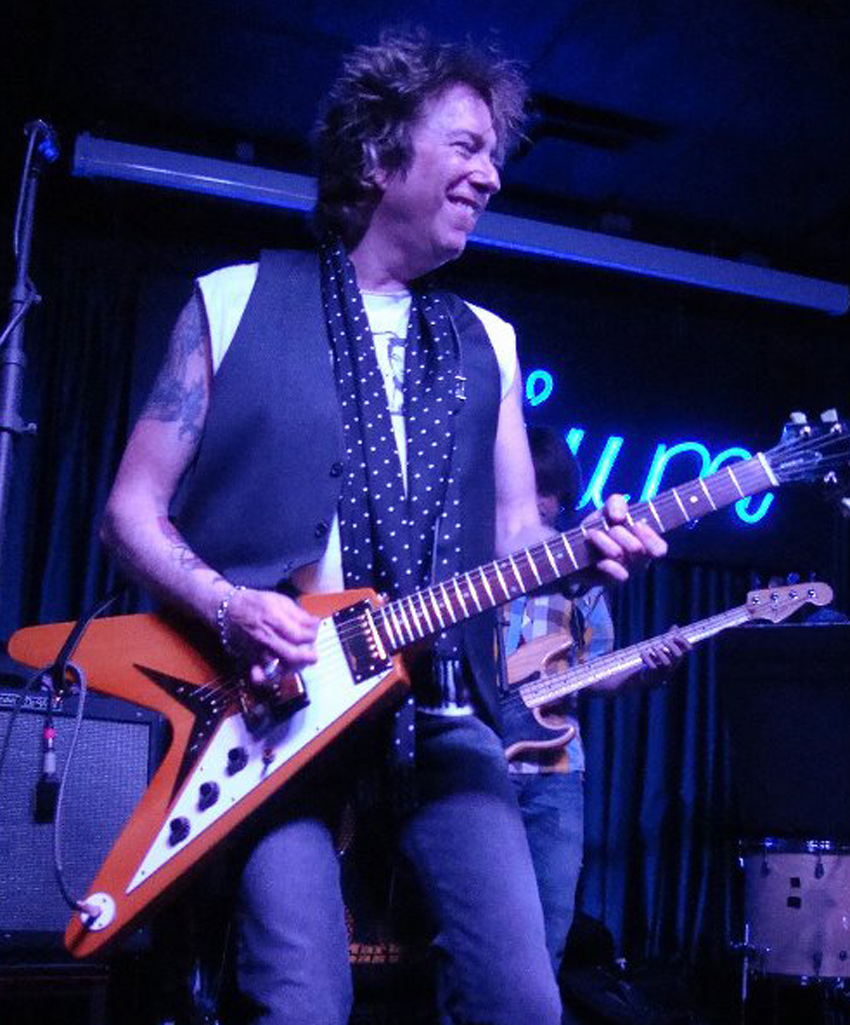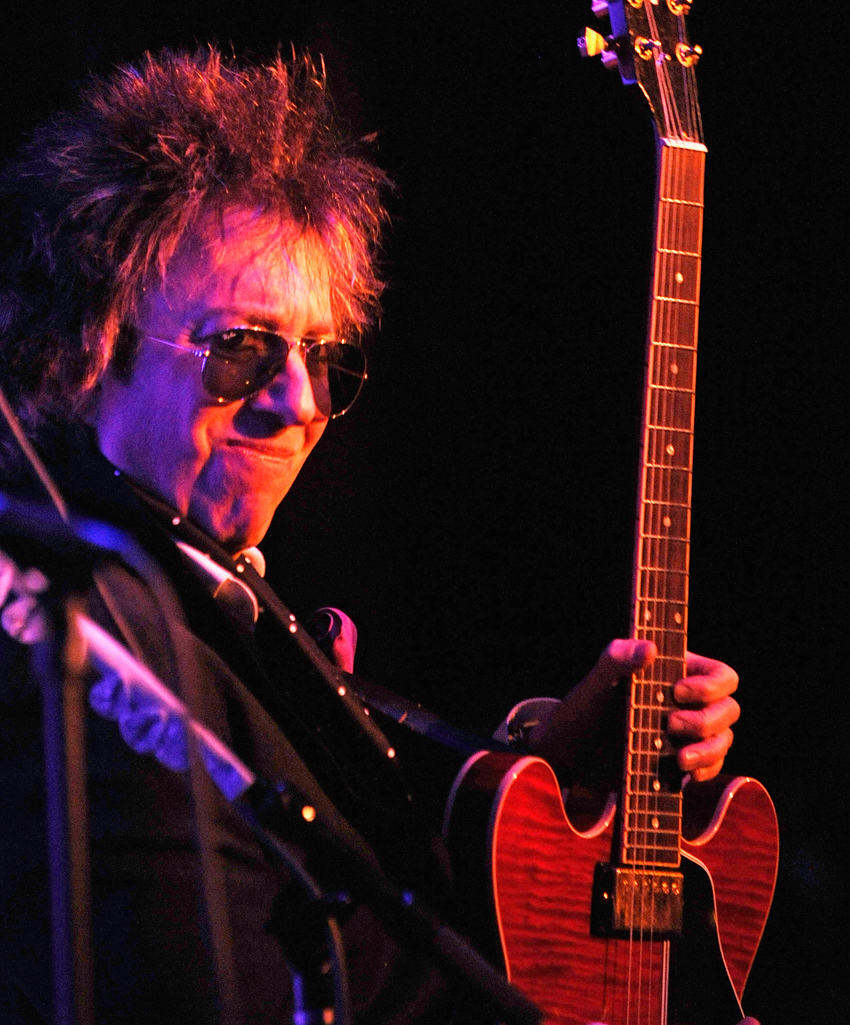
"I'm a really good, well-rounded guitar player," says Ricky Byrd. "I'm good at playing for the artist I'm playing with, whether it's Joan Jett, Roger Daltrey or whoever. It's all Chuck Berry down the center, and then I can shift left or right depending on what I need to do. Somewhere in there is my actual style, and that's what you hear on the new record."
That record would be Lifer, on which the former guitarist for Joan Jett And The Blackhearts, has penned an 11-song love letter to the British rock, Memphis soul and gritty blues that he grew listening to as a Bronx teenager. Beyond its myriad splendors - crunchy, zippy, easy-to-like tunes; clear, concise, evocative lyrics - is Byrd's wonderfully vibrant guitar playing, an idiosyncratic mix of punchy inventiveness and puckish humor.
"I really wanted to show people what I can do as a guitarist on the record," says Byrd. "Because of being in the Blackhearts, people didn't really know me. Even the guitar mags wanted to talk to Joan, so I didn't get a lot of attention. This was my chance to show off skills as a pretty spot-on rock 'n' roll and blues guitar player."
Byrd sat down with MusicRadar recently to talk about his days with Joan Jett And The Blackhearts, his reverence for '60s and '70s rock and how the eras informed Lifer, and why he's addicted to Gibson guitars - Les Pauls, especially. (You can order the CD of Lifer here and the MP3 here.)
People are always interested in an artist's big break. What was yours, and how did it lead to joining the Blackhearts?
"It was a little bit of luck and timing. I was in a band called Susan, and Tommy Motolla was our manager. We were kind of like a Raspberries-type band, which, you know, that's OK. We got dropped, and so I was hanging around New York. I got to be friendly with the people at Leiber and Krebs, who managed Joan, and a bunch of other people - I was meeting everybody. One day, Kenny Laguna, Joan's producer, called my girlfriend, [and now wife] Carol, and said, 'Your boyfriend's a guitar player, right? We're looking for somebody.'
"I didn't even know who Joan Jett was. I had seen The Runaways, but I didn't think much - I was more into Free and Led Zeppelin. But I went down to play with Joan, we got along great, and I joined the band. Pretty simple. I saw them play the last gig with Eric Ambel to kind of get a vibe of it. I thought, 'Yeah, this could be fun.' I wasn't a punk guy, but I thought I could bring some of the bands I was into - the Stones, Faces, Sparks, Bowie, all of that - into the Joan Jett thing. That's literally what I did."
Get the MusicRadar Newsletter
Want all the hottest music and gear news, reviews, deals, features and more, direct to your inbox? Sign up here.
Nobody really talks about Joan Jett as a guitarist. What would you say her strengths are as a player, and how did you try to mesh your style with hers?
"She's a really good guitar player. What she does, she does brilliantly, and that's rhythm guitar. She's solid as a rock. When I came in, I had to make some tweaks because I was coming from somewhere else - Peter Green, Leslie West, Paul Kossoff. Listen to I Love Rock 'N' Roll: after trying about six different guitar breaks, I wound up with something that's really Mississippi Queen-ish."
It is. It's a very jarring solo spot.
"Yes! Yeah, it's supposed to be that way. But it's a very simplistic solo, too. I tried it a whole bunch of other ways, and that's how it sounded the best. I'm a big 'squeaky' guitar player [laughs] - we all learned how to do that from Leslie. You kind of grab the pick at the very end. Plus, it's the sound of the Les Pauls and the Les Paul Juniors."
The guitar crunch on that song is pretty special. The sound is as thick and huge as the heaviest heavy metal.
"We were not going for subtlety, that's for sure. [Laughs] We double-tracked the guitars, and I might have even put three tracks of me putting down those chords through a Marshall. Joan probably did the same thing. The guitar I used was my black '77 Les Paul Pro Deluxe, which is just an unbelievable instrument.
"I still have that guitar, in fact. There's nary a trace of black paint on the back from all of the '80s belts I wore. It's all beat up; it's got a Johnny Cash sticker on it now. Originally, it had the P-90s in it. I used to switch things around on the road a lot. I was never one for the 'holier than thou' thing with guitars, where you have to leave them just as they are. You have to make a guitar work, you know?"
After the I Love Rock 'N' Roll album, you started getting songwriting credits. Was Joan very receptive to your songs, or was it a bit of a struggle?
"Yeah, she was receptive. You know, everybody's looking for good songs. For the first couple of years, Joan and I were together, like, 24/7. You sit around, you show each other riffs - songs develop. I kind of slipped my way in. I'm not going to say that the splits were fair [laughs], but I had no problem working that into the routine. We were a band. That wasn't always the angle in the press, but Joan always felt as if she was one of the Blackhearts."
Why did you leave the group? I can't really remember what happened there.
"It was just time. I was in the Blackhearts for 10, almost 11 years. It was time to leave. My theory is, when you're on stage in front of 30,000 people, and you're thinking about what you're going to have for dinner, it's time to leave. [Laughs] There was no animosity or anything. I don't really see Joan, although I did bump into her two years ago - we hugged. I'm sure she felt abandoned when I left, but you know, I had just gotten a Sony publishing deal, and frankly I wanted to see what else I could do. It was time. In the Blackhearts, I was playing the same set over and over; maybe one or two songs was different. Yeah, it was definitely time."
Let's talk about the new album. Your singing is terrific throughout. I read a quote of yours where you said something like "I grew into my throat."
"It' true. I'm a historian of rock 'n' roll and soul music, and in my head I can sing like Otis Redding. If I sing low, I can sing like Steve Marriot. I know the riffs; I know the way the technique goes. But how do I do that and turn it into me? My voice is a little raspy from too many years of Jack Daniels [laughs]. Really, though, it's me writing around my voice. It's funny: I've had an amazing response to my vocals on the album, but if you heard me sing a blues song or a Stones song in a club, I'd sound like just like some guy in a bar. You have to write for your voice."

"The thing squeals like a pig and feels like a stripper," Byrd says of his Epiphone Flying V. © Ricky Byrd
Between the sound of a guitar being plugged in and the title and lyrics, the song Rock 'N' Roll Boys sounds like a real mission statement.
"It is. The album is my love letter to rock 'n' roll. My attitude is, I paid the check, so I'm going to eat anything off the buffet table I want. [Laughs] I made the record without a band, but I wanted it to sound like a band; I wanted it to be Keith on one side, Ronnie on the other, and bass and drums in the middle. That's rock 'n' roll like I remember it; I wanted to be able to see that when I heard the song.
"Attitude, lyrics, the guitar sounds - I wanted this to excite people the way this kind of music excited me when I was playing with myself in my room at 13 years old. [Then, quickly] Wait a second - that sounds weird [laughs]. Playing guitar with myself, not playing… You know what I mean. [Laughs] There's great rock 'n' roll grooves all over the record.
"This is no small thing: There are a lot of people between the ages of 30 and 60 who love and miss this kind of music. Nobody's making it anymore. There might be some band in the Midwest, but we might not know of them. This is the torch I've been passed and that I'm going to carry."
You worked with Southside Johnny Lyons on a couple of songs. What does he bring to your style of songwriting - besides his obvious soulful essence?
[Laughs] "Well, he always has that. My theory is this: 100 percent of a bad song is still zero. Even though I wrote five or six songs on the record myself, I try to play with people that I want to write with. South is one of them. I've played with him for a couple of years, filling in for Bobby Bandieria when he went out with Bon Jovi. So I would bring South these riffs, and we wrote Ways Of A Woman and Things To Learn About Love. We wrote another song that didn't make the record, too. He has great phrasing and can add those little touches that nobody else does."

"I'm pretty much an addict," says Byrd, with his ES-335. "I'm a Gibson guy." © Bobby Bank
Married Man is a pretty interesting song about temptation. What was your wife's reaction to it?
"She likes it. That song came about because of some politicians a few years ago who had some, uh, 'indiscretions,' shall we say. It was the Elliot Spitzer one who got me. I think the parentheses to the song should be 'Blowjobs Don't Count.' [Laughs] The music, though, is totally Mustang Sally. I try to take the grooves that I want to play live, and that's how I write my songs. I mean, I don't want to write about cars or girls per se, so I have to look for other subjects."
What are you go-to guitars these days? I would imagine they're mostly Gibsons.
"I'm a Gibson guy top to bottom. Since my first Les Paul in '77, those are the guitars for me. In addition to the black one, I have a blue sparkle Deluxe that I bought from GE Smith in '84. What else do I have? I've got a '53 ES-295 that's really nice. Speaking of Humble Pie, I have a '61 Epiphone Coronet, just like Steve Marriot used; it sounds like an angry kid. I love 335s, so I use them. I have a '61 SG Junior, a white one. Let's see… I just bought a '76 Tobacco Sunburst Les Paul that I love. I'm pretty much an addict. I'm a Gibson guy."
You sure are. I'm curious - do any other brands ever enter the mix?
"If you look at some old Blackheart pictures, I might be playing a '61 California Corona Strat. You know, I loved it, but it just wasn't me. I love Gibsons, I love Les Pauls - I need to feel that wood. But I will say that Les Pauls are starting to get heavy to me these days, but that's due to 30 years of bad posture. So I love the 335s… But I will say that this '76 I just got is pretty remarkable. Oh, and I have a Epiphone Flying V, too. I got it from Chelsea Guitars for 500 bucks. I did some modifications to it, and I'll tell you, it sounds like a $7,000 Custom Shop V. The thing squeals like a pig and feels like a stripper. That's what I need from any guitar - that's my criteria there there." [Laughs]
Joe is a freelance journalist who has, over the past few decades, interviewed hundreds of guitarists for Guitar World, Guitar Player, MusicRadar and Classic Rock. He is also a former editor of Guitar World, contributing writer for Guitar Aficionado and VP of A&R for Island Records. He’s an enthusiastic guitarist, but he’s nowhere near the likes of the people he interviews. Surprisingly, his skills are more suited to the drums. If you need a drummer for your Beatles tribute band, look him up.
"Reggae is more freeform than the blues. But more important, reggae is for everyone": Bob Marley and the Wailers' Catch a Fire, track-by-track
“Part of a beautiful American tradition”: A music theory expert explains the country roots of Beyoncé’s Texas Hold ‘Em, and why it also owes a debt to the blues










